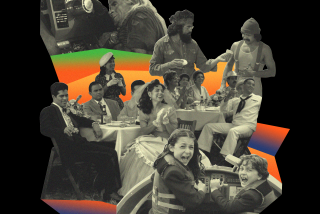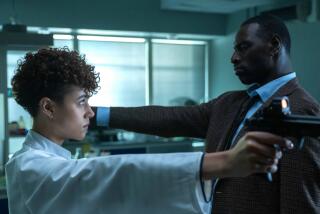10 classics provide visual poetry -- on video
- Share via
Back in the ‘70s, Bruce Lee’s “Enter the Dragon” pushed the embryonic American craze for martial arts movies into high gear. Hundreds of titles that had previously shown here only in Chinese neighborhood theaters suddenly started appearing in urban movie houses, often marred by cutting and always marred by truly horrible dubbing. Outside of the beautiful fight scenes, it was hard to take these films seriously: The dubbing reduced other qualities to mere campiness.
The discovery of the ‘80s Hong Kong New Wave by American critics and then by art-house audiences not only paved the way for the Hollywood success of John Woo, Jackie Chan, Michelle Yeoh and Jet Li but also led to a reevaluation of these earlier films.
Unfortunately there are still very few titles available in the U.S. outside of dubbed, cut and often pan-and-scan videos with horrible visual quality -- and it’s almost impossible to appreciate their true virtues. As a result, the following list is devoid of the ‘60s and ‘70s films from such masters as Zhang Che, Lau Kar-leung and Chu Yuan. While excellent new DVDs of their work for the Shaw Brothers Studio should arrive in the U.S. within the next year or so, they are out of reach. In the meanwhile, here are 10 titles available in the U.S. in their original form or something close to it.
“Crouching Tiger, Hidden Dragon”
Columbia/TriStar
The obvious starting point for those who haven’t already seen it, Ang Lee’s 2000 blockbuster was a commercial breakthrough that dwarfs even the arrival of Bruce Lee. Ang Lee had worked comfortably in Hollywood, and he managed to craft a film that falls firmly within the long tradition of Chinese action films while obviously appealing to Western audiences, as proved by its $100-million-plus box office take. The action ranges from relatively “realistic” swordplay to the sheer fantasy of characters flying and running up walls.
*
“A Touch of Zen”
Tai Seng
King Hu -- who lived in the San Gabriel Valley for several years before his death in 1997 -- was the greatest single influence on the Hong Kong New Wave directors who emerged in the ‘80s. “A Touch of Zen,” considered by many to be his masterpiece, was the first Chinese film to win a prize at a major international film festival when it received the Technical Grand Prize at Cannes in 1975. At three hours, it lacks the taut pace of his earlier “Come Drink With Me” and “Dragon Inn” (both showing at UCLA), but it’s currently the only Hu film available in the U.S., and it provides a good taste of Hu’s graceful style.
*
“Snake in Eagle’s Shadow”
Columbia/TriStar
Along with “Drunken Master,” this 1978 production put Jackie Chan on the map. Directed by Yuen Wo-ping, “Snake” is one of the earliest attempts at kung fu humor.
While extremely similar to “Drunken Master,” “Snake” has at least two brilliant scenes that make it a more satisfying movie.
*
“Yes, Madam”
Tai Seng
Female action stars have been more popular in Hong Kong than in the U.S., where it’s hard to come up with even a handful of fighting femmes. In this 1985 film from director Corey Yuen (“The Transporter,” “Fong Sai-Yuk”), you get two for the price of one -- Michelle Yeoh and Cynthia Rothrock, both in their first major roles -- kicking up a storm as a pair of cops. With a contemporary setting, it is not surprising that some of the action doesn’t fall into the basic “martial arts” categories of kung fu and swordplay, but the hand-to-hand, foot-to-ribs sequences are straight from that tradition.
*
“Dragons Forever”
Tai Seng
Another contemporary story, this 1987 action-comedy was directed by the multi-talented Sammo Hung, long before “Martial Law.” Hung co-stars with Yuen Biao and Jackie Chan, the latter surprisingly cast as a slightly sleazy lawyer. Many of the best scenes are action slapstick, but Chan’s final battle with the awe-inspiring Benny “The Jet” Urquidez (“Grosse Pointe Blank”) is the real thing.
*
“Once Upon a Time in China 2”
Columbia/TriStar
This sequel to director Tsui Hark’s 1991 smash -- which swept the Hong Kong equivalent of the Oscars, revived the period martial arts film and made Jet Li a superstar -- is tighter than, and at least as entertaining, as its predecessor. A few plot points are confusing but, as in the original, Tsui stages a dazzling climactic fight scene in a warehouse filled with ladders and bamboo scaffolds.
*
“The Bride With White Hair”
Tai Seng
This 1993 masterpiece from director Ronny Yu (“The 51st State”) is one of the most visually sumptuous films to emerge during the ‘90s. A hyper-charged variation on Romeo and Juliet, with Leslie Cheung (“Farewell My Concubine,” “A Better Tomorrow”) and Brigitte Lin Ching-Hsia (“Peking Opera Blues”), it uses exciting fight scenes and swordplay as window-dressing for what is essentially a serious romance about trust and betrayal.
*
“The Legend of Drunken Master”
Dimension
We’ll break our own rule about dubbing to include Jackie Chan’s 1994 “Drunken Master 2,” which was released by Miramax/Dimension late in 2000 under the name above.
While dubbing is always bad, in this case it’s less bad than usual, and the movie is essentially uncut. Lau Kar-leung is the credited director, though Chan took over during production and directed much of the film himself. Chan, approaching 40, got himself in the best shape of his life to do a film with brutal, hard-edged fight scenes.
*
“Fong Sai-yuk”
Tai Seng
Corey Yuen directed this 1993 Jet Li vehicle that is among the most entertaining “wire work” films. Almost all the fights involve outrageous super-human moves that can be created only by trussing up the performers in “invisible” wire harnesses. It may not be realistic but, given its romance, comedy and insane stunt concepts, realism is just about the only thing missing.
*
“Iron Monkey”
Dimension
For once, Miramax/Dimension didn’t use dubbing when it reissued this 1993 Yuen Wo-ping film two years ago.
Donnie Yen (from Zhang Yimou’s upcoming “Hero”) and Yu Rong-Guang star in a period Robin Hood story. The film is a deliriously compact stew of qualities that made film buffs go berserk over Hong Kong cinema in the early ‘90s. It’s funny, heroic, exaggerated and most of all energetic; it speeds along as though afraid of losing audience attention.
More to Read
Only good movies
Get the Indie Focus newsletter, Mark Olsen's weekly guide to the world of cinema.
You may occasionally receive promotional content from the Los Angeles Times.










